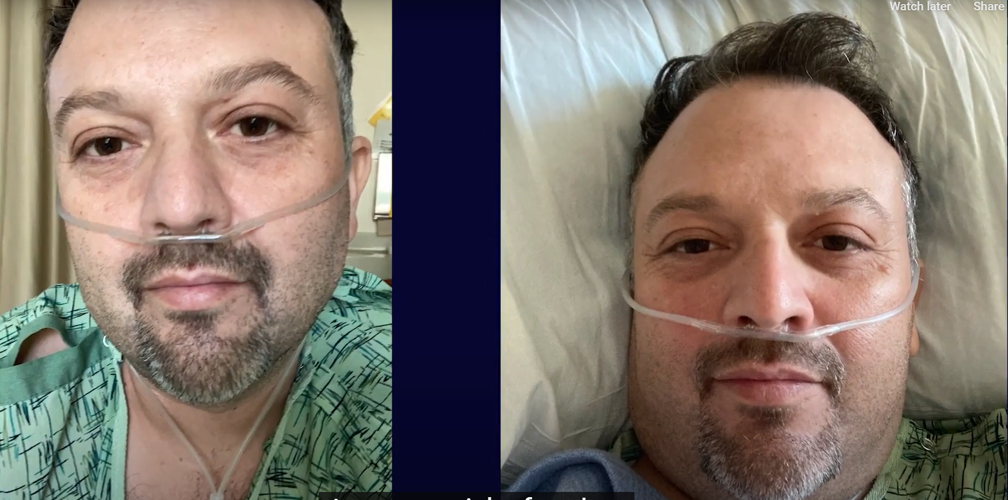
César Serrano
César Serrano went from having trouble breathing to learning that he only had three months to live. The asthma medication his doctor prescribed wasn’t helping, so he ordered a CT scan and biopsy, which led to his stage-four lung cancer diagnosis.
"Honestly, no one's prepared for something like this,” the Ontario resident said. “My reaction, of course, was devastation … no one's prepared for this and of course, my family reacted the same way. We were all very sad, you know, very confused.”
With this life-changing diagnosis, Serrano’s family became his biggest support system that summer of 2021.Despite chemotherapy and other cancer treatments, his symptoms kept worsening.
“I was in a very hard situation, being bombarded with all these treatments and medications.” Serrano said. “My health was taking a turn for the worse. My family and I were preparing for my imminent death. I'm signing documents, basically what people sign when they're going to die.”
Things did not look good, until one day his doctor came back with test results from biomarker testing, a laboratory procedure that analyzes a sample of blood, tissue or other body fluid to identify specific genes, proteins or other molecules.
Serrano was unaware that his doctor had ordered that along with his biopsy. “When I received the biomarker testing results, it led to the treatment that saved my life. It was truly a miracle,” Serrano said. “It was a roller coaster of emotions, happiness, confusion and on the other side, it's scary at the same time.”
Biomarker testing helps ensure cancer patients get the right treatment at the right time. Doctors can also use it to precisely target cancer treatments so they don't have to take generalized treatments like chemotherapy and radiation, which may not be as effective.
“These other treatments were creating more damage in my cells and in my body,” Serrano said. With his biomaker testing results targeting the right lung cancer treatment, he was getting better and eventually his symptoms reversed.
Biomaker testing led him to find out about his rare type of cancer called ALK lung cancer, which is a type of non-small cell lung cancer (NSCLC) in which the cancer cells have a mutation in the anaplastic lymphoma kinase (ALK) gene. Serrano also became aware that he was one of the 5% of people who had become positive for this rare cancer.
After his treatment, in a matter of two to three weeks, he was able to breathe on his own without an oxygen machine and go back to his daily activities without any help or supervision.
Although he has to take his medication and receive treatment for the rest of his life, he currently considers himself to be in remission after four long years of battling lung cancer. “I recommend this test for, you know, everyone that is struggling with cancer,” Serrano said.

Cesar and his family.
While biomarker testing helps connect patients to the most effective treatment for their cancer, it can also help them save invaluable time, physical and emotional strain, as well as money, by avoiding treatments that could prove ineffective or unnecessary.
Biomarker testing is increasingly important for cancer care and for the treatment of other diseases, including arthritis, other autoimmune conditions and rare diseases, with research happening in many other areas, including Alzheimer’s, other neurological conditions, cardiology and more.
“Nearly 60% of all cancer drugs approved in the last five years require or recommend biomarker testing before use. Improving coverage for biomarker testing across insurance types is a crucial step to reduce disparities in cancer outcomes and survivorship and is increasingly important for the treatment of certain rare and autoimmune diseases, such as arthritis,” said Autumn J. Ogden-Smith, California Legislative Director for the American Cancer Society Cancer Action Network (ACS CAN).
California Governor Gavin Newsom signed the state budget on June 29, which included funding for the implementation of Senate Bill 496 starting this month. Authored by Senator Monique Limón D-Santa Barbara and co-sponsored by ACS CAN and the University of California, SB 496 requires MediCal and other state-regulated insurance plans to cover comprehensive biomarker testing, which is key to accessing precision or personalized medicine.
California is currently joining 18 other states that have enacted similar legislation. As an advocate for biomarker testing, Serrano became a powerful voice in 2023, along with others who shared his experience and the ACS CAN, which had urged the legislature to pass the bill.

He was at the Capitol as part of ACS CAN's Cancer Action Day, when volunteers from across the state meet with legislators urging them to support legislation that helps everyone have a fair and just opportunity to prevent, detect, treat and survive cancer. This year was Cesar's first attending Cancer Action Day, which took place on April 10.
For more information on precision medicine, cancer biomarkers, current barriers to biomarker testing and ACS CAN’s policy recommendations, visit www.fightcancer.org/biomarkers.























(0) comments
Welcome to the discussion.
Log In
Keep it Clean. Please avoid obscene, vulgar, lewd, racist or sexually-oriented language.
PLEASE TURN OFF YOUR CAPS LOCK.
Don't Threaten. Threats of harming another person will not be tolerated.
Be Truthful. Don't knowingly lie about anyone or anything.
Be Nice. No racism, sexism or any sort of -ism that is degrading to another person.
Be Proactive. Use the 'Report' link on each comment to let us know of abusive posts.
Share with Us. We'd love to hear eyewitness accounts, the history behind an article.